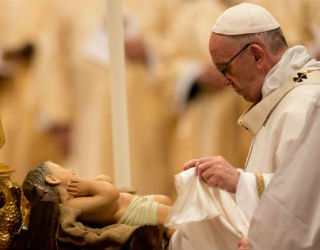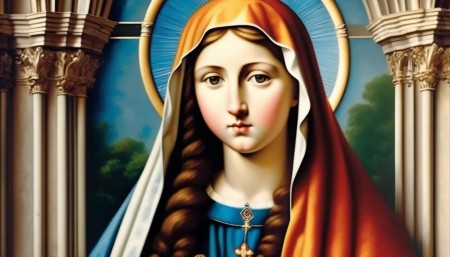We ask you, urgently: don’t scroll past this
Dear readers, Catholic Online was de-platformed by Shopify for our pro-life beliefs. They shut down our Catholic Online, Catholic Online School, Prayer Candles, and Catholic Online Learning Resources—essential faith tools serving over 1.4 million students and millions of families worldwide. Our founders, now in their 70's, just gave their entire life savings to protect this mission. But fewer than 2% of readers donate. If everyone gave just $5, the cost of a coffee, we could rebuild stronger and keep Catholic education free for all. Stand with us in faith. Thank you.Help Now >
Pope Francis sends powerful message out on Christmas
Pope Francis said the birth of Jesus is an invitation for all Christians to imitate him in reaching out to embrace the vulnerable and all those who are suffering, during his celebration of Christmas Mass.

Pope Francis reminds us to reach out to the vulnerable.
Highlights
Catholic Online (https://www.catholic.org)
12/24/2017 (6 years ago)
Published in Christmas / Advent
Keywords: Pope Francis, Pope, Christmas, Christ, Jesus
Vatican City (CNA/EWTN News) - The joy that we are called to celebrate, share, and proclaim at Christmas is "the joy with which God, in his infinite mercy, has embraced us pagans, sinners and foreigners, and demands that we do the same," the Pope said the evening of Dec. 24 during his homily at St. Peter's Basilica.
The faith Christians proclaim at Christmas, as they adore the infant who came to offer salvation to sinners, is one that enables us to see God "in all those situations where we think he is absent," he said.
"He is present in the unwelcomed visitor, often unrecognizable, who walks through our cities and our neighborhoods, who travels on our buses and knocks on our doors," Francis said, explaining that this faith is also an invitation to develop "a new social imagination, and not to be afraid of experiencing new forms of relationship, in which none have to feel that there is no room for them on this earth."
Christmas, then, "is a time for turning the power of fear into the power of charity, into power for a new imagination of charity," he said.
And the type of charity we are invited to live during Christmas is one "that does not grow accustomed to injustice, as if it were something natural, but that has the courage, amid tensions and conflicts, to make itself a 'house of bread,' a land of hospitality."
In choosing to be born into the world as a tiny infant, Christ offers himself to us in a way that we are able to hold him, lift him up, and embrace him, Francis said. In the same way, we are also called "to take into our arms, raise up and embrace the thirsty, the stranger, the naked, the sick, the imprisoned."
"In this Child, God invites us to be messengers of hope," he said. "He invites us to become sentinels for all those bowed down by the despair born of encountering so many closed doors. In this child, God makes us agents of his hospitality."
He noted how difficult it was for Mary and Joseph to be forced from their homeland and make a long, uncomfortable journey while expecting a child. The situation was exacerbated when they finally arrived to Bethlehem only to discover there was no room for them in the city.
And yet it was here, "amid the gloom of a city that had no room or place for the stranger from afar, amid the darkness of a bustling city which in this case seemed to want to build itself up by turning its back on others" that the "revolutionary spark" of God's love was lit, he said.
"In Bethlehem, a small chink opens up for those who have lost their land, their country, their dreams; even for those overcome by the asphyxia produced by a life of isolation."
Francis noted that there are many others whose footsteps are hidden in those of Mary and Joseph, including the millions of people "who do not choose to go away but, driven from their land, leave behind their dear ones."
"In many cases this departure is filled with hope, hope for the future; yet for many others this departure can only have one name: survival," he said, noting that there are many who must survive "the Herods of today, who, to impose their power and increase their wealth, see no problem in shedding innocent blood."
Mary and Joseph, who are the first to embrace "the one who comes to give all of us our document of citizenship," are faced with a similar situation, finding themselves fleeing to a new land where they have no home or roof over their head.
However, in the "poverty and humility" of his birth, Christ both proclaims and shows that "true power and authentic freedom are shown in honoring and assisting the weak and the frail," Francis said.
Among the weakest and most frail members society at the time were the shepherds, he said, noting that because of their work, they were often forced to live on the margins. Because their state in life prevented them from participating in the traditional religious purification rituals, the shepherds were considered "unclean."
"Everything about them generated mistrust. They were men and women to be kept at a distance, to be feared," Pope Francis said, noting how they were widely considered "pagans among the believers, sinners among the just, foreigners among the citizens."
However, these are the ones to whom the angel first appears with the announcement that the savior had been born, he said, adding that "this is the joy that we tonight are called to share, to celebrate and to proclaim" at Christmas.
Like Christ, who in his mercy bent down and embraced us as sinners, pagans, and foreigners, we must also learn to develop a new gaze that looks at others with charity and hospitality, he said, and urged Christians to imitate Jesus in lifting up and embracing the weak and marginalized.
He closed his homily by praying that the gift of the "little Child of Bethlehem" would move us, so that "your crying may shake us from our indifference and open our eyes to those who are suffering."
"May your tenderness awaken our sensitivity and recognize our call to see you in all those who arrive in our cities, in our histories, in our lives," he said, and prayed that the "revolutionary tenderness" of the Christ Child would "persuade us to feel our call to be agents of the hope and tenderness of our people."
---
'Help Give every Student and Teacher FREE resources for a world-class Moral Catholic Education'
Copyright 2021 - Distributed by Catholic Online
Join the Movement
When you sign up below, you don't just join an email list - you're joining an entire movement for Free world class Catholic education.
-

-
Mysteries of the Rosary
-
St. Faustina Kowalska
-
Litany of the Blessed Virgin Mary
-
Saint of the Day for Wednesday, Oct 4th, 2023
-
Popular Saints
-
St. Francis of Assisi
-
Bible
-
Female / Women Saints
-
7 Morning Prayers you need to get your day started with God
-
Litany of the Blessed Virgin Mary
Daily Catholic
 Daily Readings for Wednesday, November 27, 2024
Daily Readings for Wednesday, November 27, 2024 St. James Intercisus: Saint of the Day for Wednesday, November 27, 2024
St. James Intercisus: Saint of the Day for Wednesday, November 27, 2024 Prayer to Saint Anthony of Padua: Prayer of the Day for Wednesday, November 27, 2024
Prayer to Saint Anthony of Padua: Prayer of the Day for Wednesday, November 27, 2024- Daily Readings for Tuesday, November 26, 2024
- St. John Berchmans: Saint of the Day for Tuesday, November 26, 2024
- Act of Entrustment to Mary: Prayer of the Day for Tuesday, November 26, 2024
![]()
Copyright 2024 Catholic Online. All materials contained on this site, whether written, audible or visual are the exclusive property of Catholic Online and are protected under U.S. and International copyright laws, © Copyright 2024 Catholic Online. Any unauthorized use, without prior written consent of Catholic Online is strictly forbidden and prohibited.
Catholic Online is a Project of Your Catholic Voice Foundation, a Not-for-Profit Corporation. Your Catholic Voice Foundation has been granted a recognition of tax exemption under Section 501(c)(3) of the Internal Revenue Code. Federal Tax Identification Number: 81-0596847. Your gift is tax-deductible as allowed by law.








 Daily Readings for Wednesday, November 27, 2024
Daily Readings for Wednesday, November 27, 2024 St. James Intercisus: Saint of the Day for Wednesday, November 27, 2024
St. James Intercisus: Saint of the Day for Wednesday, November 27, 2024 Prayer to Saint Anthony of Padua: Prayer of the Day for Wednesday, November 27, 2024
Prayer to Saint Anthony of Padua: Prayer of the Day for Wednesday, November 27, 2024

